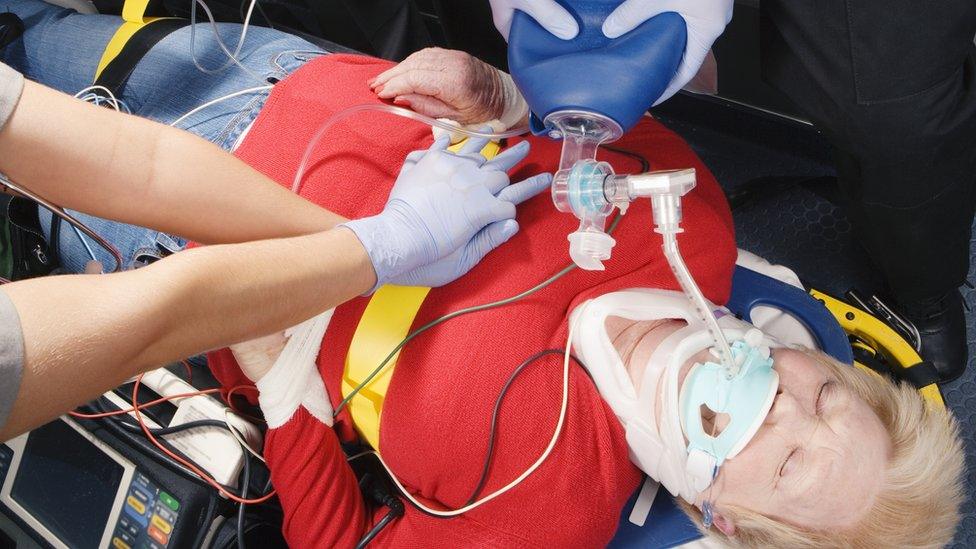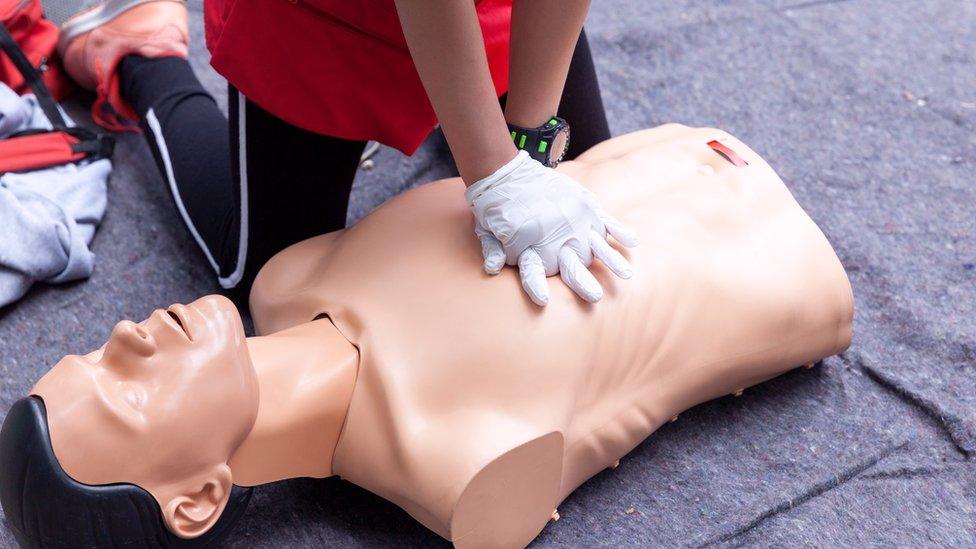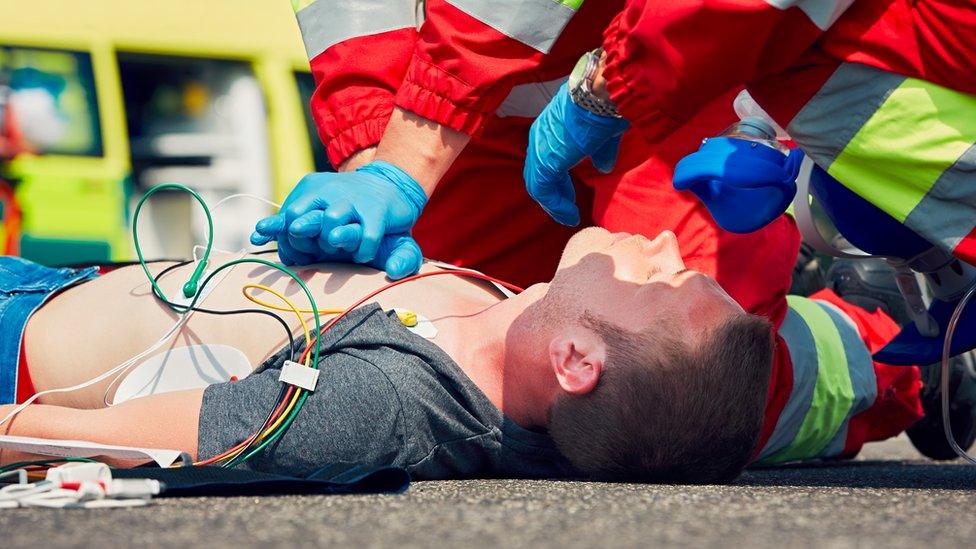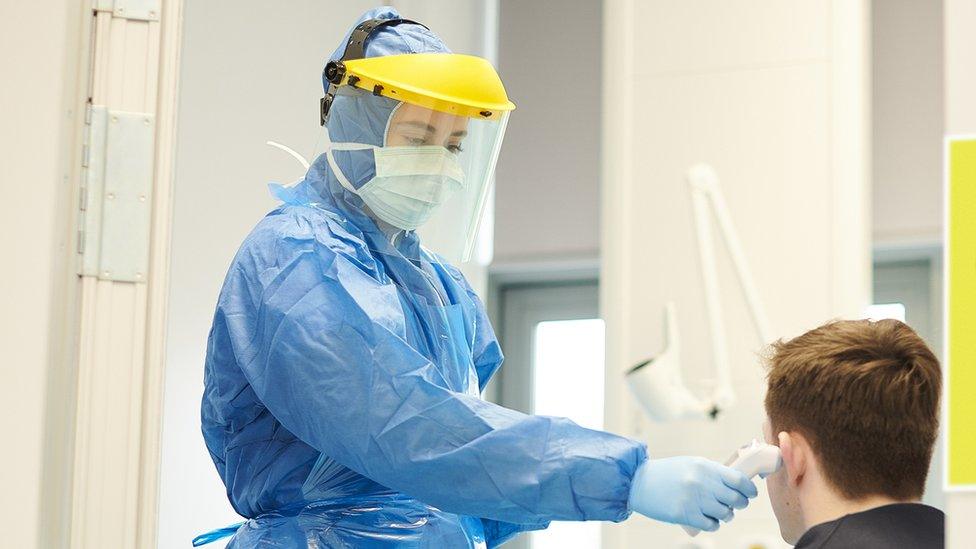Is CPR safe during coronavirus crisis?
- Published

Since lockdown began a debate has been ongoing around cardiopulmonary resuscitation (CPR).
CPR is an emergency treatment that tries to restart a person's heart or breathing and its most important components are chest compressions to pump blood around the body, and rescue breaths to provide oxygen, often referred to as the 'kiss of life'.
Since the lockdown began health officials have recommended not to use mouth-to-mouth CPR because of the risk of catching a potentially high dosage of Covid-19.
But, according to the Resuscitation Council UK, chest compressions are still permitted for members of the public, provided they follow the correct steps.
What is the advice for the public?

About 30,000 out-of-hospital cardiac arrests happen each year in the UK - and 80% of these happen in the home. If no immediate action is taken these people will be dead within minutes.
Should you be put in the situation where you need to administer CPR, Resuscitation Council UK urges people to firstly call for an ambulance and then "use a towel or piece of clothing and lay it over the mouth and nose" of the patient.
They say you should then start chest compressions to the tempo of "Stayin' Alive" by the Bee Gees, and, you should use a defibrillator if one is publicly available.
Resuscitation Council UK Vice President Dr Andrew Lockey told Drivetime: "By placing a towel over the victims face, the aim is provide a level of additional protection to enable them to save the life of a loved one without placing themselves at increased risk."
Is the advice different for doctors and nurses?

Dr Lockey said the risk to health care staff in hospitals was greater because there was a much higher risk of the patient having Covid-19.
He said: "We are seeing far too many healthcare personnel who are dying from Covid-19, and they need to be adequately protected in this high risk environment.
"The difference with the home setting is that the cardiac arrest may not be related to Covid-19 and household members who witness it will already have been exposed to the same risks for infection."
In line with this guidance, and since the lockdown, the St Andrew's First Aid charity has suspended its training programmes of CPR, as it was no longer deemed safe.
Where is there disagreement?

There are currently conflicting opinions over what personal protective equipment (PPE) doctors and nurses should use to carry out CPR on patients with Covid-19 in hospitals.
The Resuscitation Council UK argues that CPR is an "invasive" action and it describes it as an "aerosol generating procedure" (AGP), external - meaning one which can potentially expose the doctor or nurse to higher dosage of infection.
This is important because the World Health Organisation (WHO) says the highest-level PPE should be worn to carry out AGPs. That means wearing what's known as an FFP3 mask, eye and face protection, a fluid resistant long-sleeved gown and gloves.
And the Resuscitation Council supports the WHO's decision when it comes to AGPs and full PPE.
But, as it stands, the English, Scottish, Welsh and Northern Irish governments have taken the decision that chest compressions and defibrillation are not AGPs.
This has led some health professionals to question whether advice is being downgraded to accommodate for a possible lack of high-level PPE.
This is what one Scottish GP told BBC Scotland's Drivetime programme: "We are effectively asking those who work in primary care and community settings (and indeed bystanders) to risk their lives on a futile exercise. We simply cannot be adequately protected."
A Resuscitation Council UK (RCUK) spokesman admitted "significant confusion" existed across the NHS on this matter.
"Our concern remains that not providing Level 3 PPE to health care professionals performing chest compressions on Covod-19 patients is a clear risk to their safety," he said.
"In a pandemic where healthcare professionals are tragically dying, we challenge the rationale for advocating a lesser form of PPE where expert consensus states that such a risk to safety exists."
What are government saying?


A Scottish government spokesman said: "It is totally incorrect to say there is in Scotland a lack of facemasks or any other part of PPE.
"We currently have adequate supplies and we are working all the time to build still further on the substantial enhancements we have made to the distribution of PPE to ensure the right equipment reaches the right staff with the highest degree of urgency.
"Cardiac arrest is a rare event and paramedics and other healthcare workers are highly trained at delivering appropriate resuscitation at the scene of the arrest. These interventions are always risk assessed - including on the use of PPE - and these assessments exist to save lives while protecting staff.
"The current four nations guidance is that chest compressions are not considered as aerosol generating procedures and we will keep this under review."
When asked on Drivetime specifically about chest compressions Scotland's National Clinical Director Jason Leitch said "people should only do it, if they feel safe to do so".
According to the National Records for Scotland, external, the diagnosis of heart attacks in Scotland (myocardial infarction) has increased from 375 per 100,000 of the population in 2006-7 to 518 in 2015-16, an increase of 37.9%.